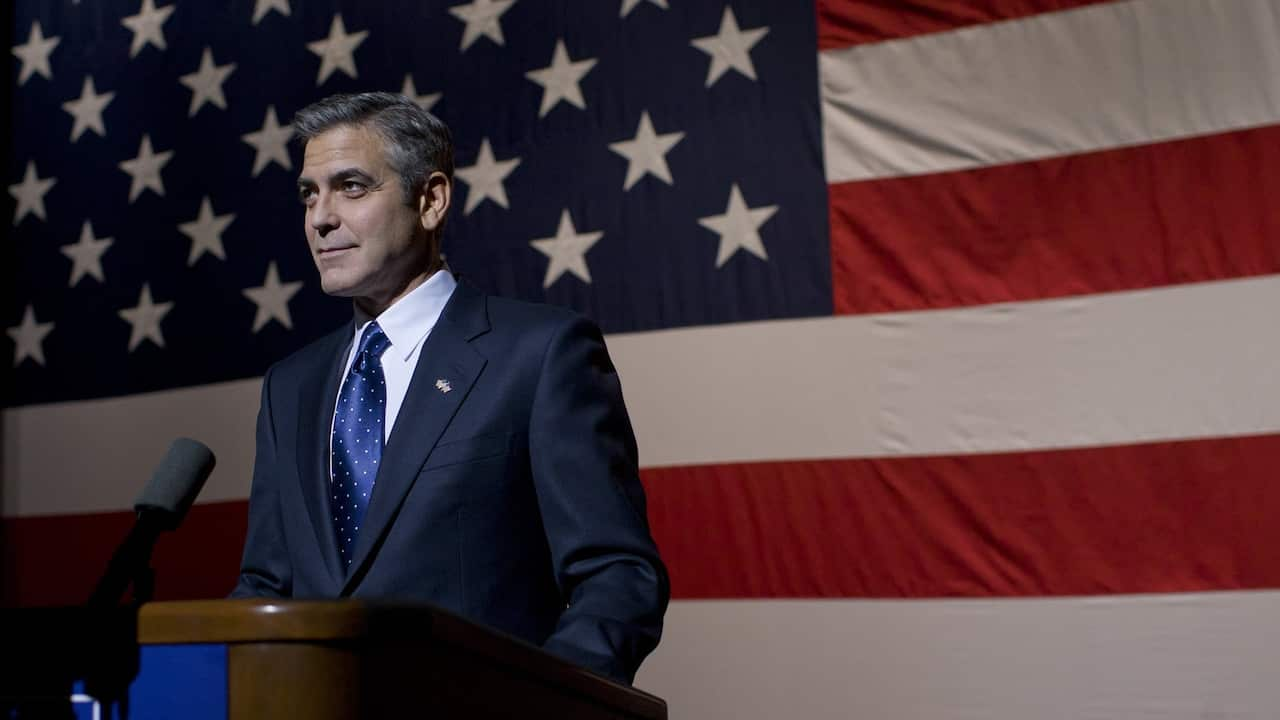The Ides of March, the new political thriller directed by George Clooney, is fast, smart and meaner than a room full of spin-doctors. Clooney is famously a Democrat but Ides is not in the thrall of politics or the romantic spell of promising politicians a la The West Wing. Underneath the fast pace, and the up-to-the-minute seen-it-all-and-done it-all argot of seasoned campaigners that spikes the film's wall-to-wall talk, there's a profound sense of waste – waste of ideals, energy and good work. The movie barrels along on intrigue and a plot about backstabbing (the title tells you that) but the cynicism quickly turns sour, because instead of creating a sense of outrage, there's a point where all the vindictiveness gets to be kind of exciting.
Still, that may well be Clooney's ironic spin on why elections are unreliable barometers of integrity – everyone involved from the lowliest intern to the viewing public gets high on the process. As Ides would have it, the whole circus is an adrenaline rush predicated on protecting one's own back. As the basis for an exciting melodrama, that's a fine dramatic premise, but it’s more than a little glib and a bit cute. Watching the film, you're reduced to a kind of 'gotcha-ghoul', eagerly sucking up the slime as scene after scene reveals the decadent cruel truth about each of the characters.
Clooney and his long-time collaborator Grant Heslov worked with playwright Beau Willimon on the film's script, which actually has little to do with party politics and everything to do with personal politics (Ides is based on the latter's 2008 play Farragut North). And if the film has something of a conceptual flaw it may well be the thrust of the plot, which asks, is it possible for a genius media operator to be naïve?
Ryan Gosling plays this character, called Stephen, and predictably the actor is terrific; his choices make sense, and he's credible. (Only after the film's over does the plotting start to feel conveniently mechanical.) In the story, he's part of the management team running a presidential primary race in Ohio for Clooney's Democrat, Governor Mike Morris. Stephen's boss is the cynical Paul, played by Philip Seymour Hoffman, an actor who can deliver smart-talk at lightning speed. His opposite number in the film is Paul Giamatti, another great actor who can talk really fast and make words dance; he plays Duffy, campaign manager for Morris' opponent. He's cynical too. Probably more cynical than both of them is Marisa Tomei, who plays a journalist who gets stories by pretending to be 'friendly.' Stephen perhaps isn't cynical enough; Duffy scores off Stephen by virtue of the younger man's integrity. From there the film spirals into a virtual blood bath of double-dealing and blind ambition with the primary as a secondary prize – the real stakes here for the characters becomes professional survival.
Another important character is Evan Rachel Ward, who plays Molly, an intern that sets out with cool precision to seduce Stephen. She's cynical too, but in a way that's not helpful, ultimately, to anyone, and in politics that makes her useless (and innocent).
Clooney's best film to date as director, 2005's Good Night and Good Luck, was about ethics in journalism. It was fascinated by detail, and consumed by perplexing, harsh ironies. There's a lot of irony here, too. Clooney clearly relishes the visual possibilities a campaign provides; the phony theatrics, the abundance of patriotic trimmings, the inflated rhetoric. (And if anything Clooney satirises post-Obama Democrat idealism; at one point his Morris tells the public that America will "run without Arab oil".) Here Clooney fashions his visuals to drive home the point that politics is show business; the Stars and Stripes seems always there to form the backdrop for Morris' speeches. But backstage, Cooney's spin-doctors scheme and plot and the red from Old Glory bathes the actors in a bloody shadow, and back-lit from behind the light the Stars and Stripes is transparent and threadbare.
It's nothing to suggest that George Clooney the actor has got a wicked sense of humour; his now lined but still handsome face seems forever pulled into a tense smirk that gives off a hum of tension. Watch him on screen in just about anything and sooner or later his lips will crack into a half grin and say something funny. Clooney has a stand-up comic's gift of saying obvious things and making them sound wise. Clooney in life and on-screen comes off as smart. It's an intelligence, though, that's vulnerable and worried and a little tortured. Clooney, successful, famous and desirable, is in the perfect position to make a movie like this about the perils of ego. And for some that's going to look a little easy, a bit evasive. Still, the film ends on a note of moral horror that's truly chilling. It doesn't exactly atone for the film's slick superiority. But at least it's a moment that feels earned, for the character and for the audience. What's been broken here just doesn't go back together. What gets destroyed in the cut and thrust of political back stabbing in the Ides of March has to do with what people used to call soul; and spin doctors can't fix that sickness. They can only pretend.
Watch 'The Ides of March'
Monday 17 April, 7:35pm on SBS World Movies / Streaming after at SBS On Demand
M, AD, CC
USA, 2011
Genre: Drama
Language: English
Director: George Clooney
Starring: Ryan Gosling, George Clooney, Philip Seymour Hoffman, Paul Giamatti, Evan Rachel Wood, Marisa Tomei, Jeffrey Wright, Max Minghella, Jennifer Ehle







